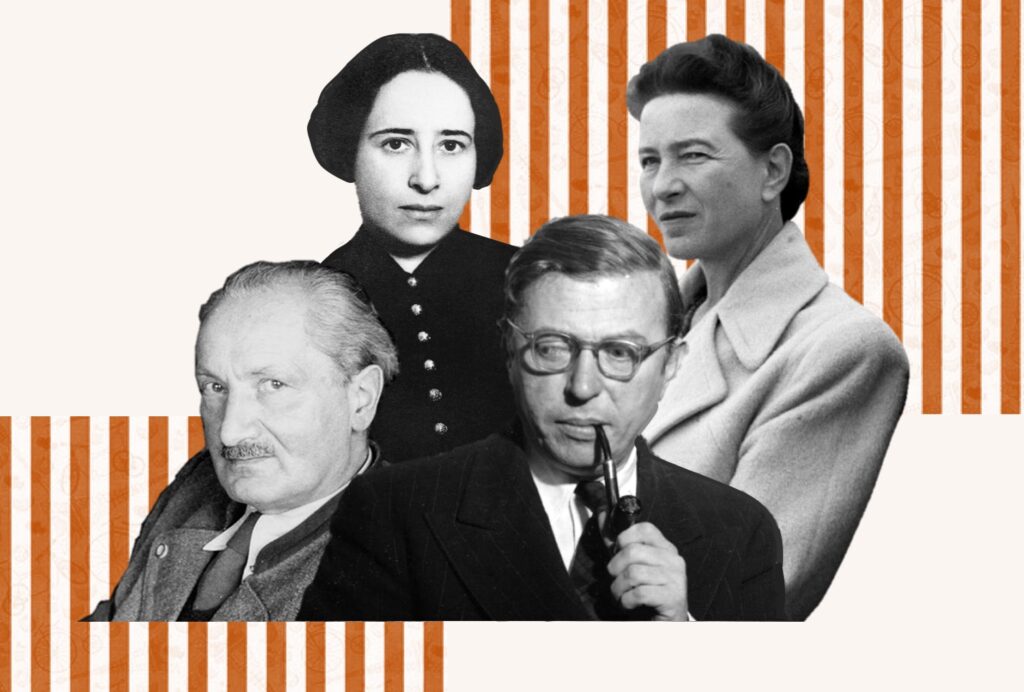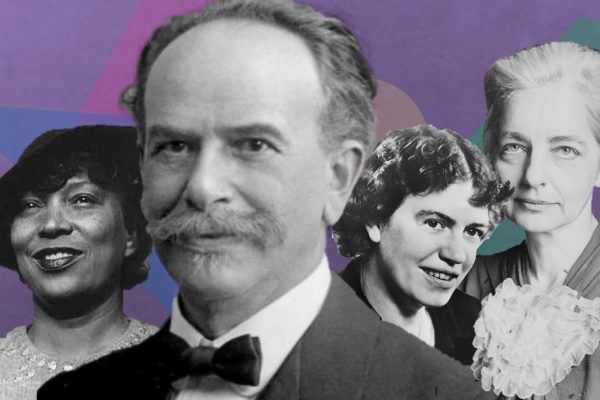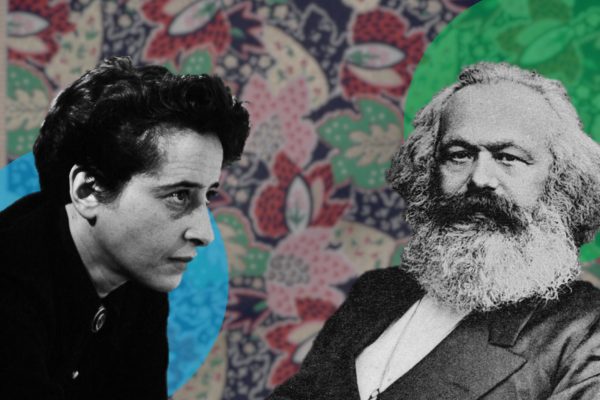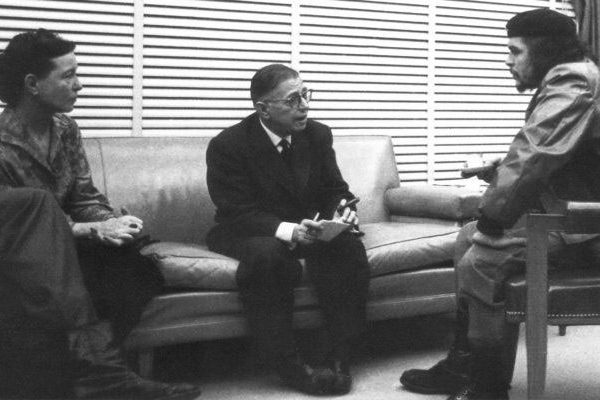Existentialist ideas have seen a remarkable comeback during the COVID-19 pandemic, from Albert Camus’s frequently invoked novel The Plague, Friedrich Nietzsche’s turn to tragedy, and Simone de Beauvoir’s and Jean-Paul Sartre’s critique of bad faith, to Giorgio Agamben’s Carl Schmitt–inspired musings about the state of emergency and what Michel de Montaigne, Martin Heidegger, and Blaise Pascal can teach us about facing death.
Existentialist ideas have seen a remarkable comeback during the COVID-19 pandemic, from Camus, Sartre, and de Beauvoir to Heidegger and Pascal.
The thread running through all these appeals to existentialism is a sensitivity to human fragility felt to be especially pertinent in the midst of a global pandemic and stark disruptions of social order. Even Jürgen Habermas, not typically thought of as an existentialist philosopher, said in a recent interview that we have never had so much knowledge about our non-knowledge and about the necessity to act and live in conditions of uncertainty. As the writer Rebecca Solnit describes it:
We are in the middle and the end is not in sight. We are waiting, which is among most people’s least favorite thing to do, when it means noticing that you have taken up residence in not knowing. We are in terra incognita, which is where we always are anyway, but usually we have a milder case of it and can make our pronouncements and stumble along.
This resurgence of interest in existentialism is not entirely surprising. The body of work we now think of as existentialist emerged during the first half of the twentieth century in conflict-ridden Germany and France, where uncertainty permeated every dimension of society. Its major advocates and sole explicit supporters were Beauvoir and Sartre, who gained immense popularity in postwar France. They followed German existentialist thinkers such as Heidegger, Karl Jaspers, and Karl Barth, who had already risen to fame in interwar Weimar with their readings of Nietzsche and Søren Kierkegaard. Though their work varied in the details, they all shared a type of thinking that rejected religious and political dogma, expressed scorn for academic abstraction, and focused on the finitude and absurdity of human existence.
Existentialists of the twentieth century shared a type of thinking that rejected religious and political dogma, expressed scorn for academic abstraction, and focused on the finitude and absurdity of human existence.
Yet, while existentialism emerged in modern Germany and France, existentialist concerns of human meaning have shaped the history of philosophy and religion for millennia. The early modern skeptics Montaigne and Pascal, for just two examples, are often considered existentialists avant la lettre. And as Sarah Bakewell recounts in At the Existentialist Café (2016), Sartre, reflecting on the anxieties of 1938, compared his time to Hellenistic Greece, when Athenians turned away from the calm reasoning of Aristotelian science toward the more personal and transformative thinking of the Stoics and Epicureans, “who taught them to live.”
Last century’s existentialism won wide appeal in part because of the special new emphasis it placed on ideas of human freedom. What Sartre called “bad faith,” Heidegger “inauthenticity,” and Jaspers “life in a shell”: each articulates a form of distraction that blinds us to our freedom. One reason we define ourselves and others on the basis of class, religion, race, and nationality, or even childhood influences and subconscious drives, is to gain control over the contingencies of the world and insert ourselves in the myriad ways people have failed and succeeded in human history. But this control is illusory and deceptive, existentialists insisted. It might be an alluring distraction from our own fragility but it eventually yields a pseudo-power that corrodes our ability to live well.
Instead, they suggested reversing perspective. Why, they wondered, do we have to view existential, political, and epistemic uncertainties as a problem that requires a solution? Given our vulnerability, shouldn’t groundlessness itself become a ground for human existence? A generation later, the sociologist Bruno Latour provocatively asked whether we have ever been modern. Each in their own way, existentialists had raised a similar question: whether we have ever been certain.
Over the last few months, we have witnessed a broad range of responses to a profound new wave of social and personal uncertainty. On the one hand, and for the most part, people have expressed an urge to restore certainty. We might have found that we prefer to be certain about the future, however grim it may be. We might have sought targets to blame for the suffering, pain and hopelessness that surround us. Politically speaking, citizens have looked to strong leaders for containment and control, a phenomenon some call the “authoritarian reflex.” And the uncertainty vacuum has been filled by conspiracy theories, war rhetoric, the denial of scientific facts, and an increase in surveillance measures. On the other hand, there have also been responses that find containment in the admission of not knowing, in political leaders who express their fallibility, and in a form of hope “inextricable from uncertainty” as it opens up a critical space to imagine and build the future. These latter voices have been quieter. They demote greatness, revenge and heroic victory and regard the promise of control with skepticism.
Existentialist writers give us a sense of how we might imagine dwelling in not knowing—beyond resignation or cynicism, and beyond false promises of salvation.
Where does existentialism fall along this spectrum? Can its turn to uncertainty really teach us something about life in terra incognita? Not only do existentialists define anxiety as our “dizziness of freedom” (in the words of Kierkegaard)—the dizzying effect of looking into the contingent boundlessness of one’s own possibilities as a precondition for personal growth—but many also offer reflections on plagues and epidemics. They invoke these terms metaphorically in order to expose the relation between political crises and crises of human meaning. At a moment when a biological respiratory plague lays bare and reinforces the systemic racism that suffocates and chokes Black lives, this connection could not be timelier.
Yet existentialist responses to human dizziness also vary strongly. Often, their idea of uncertainty ends in some higher form of certitude. Heidegger, for instance, glorified the tragic hero, who reaches into the abyss with resolve and determination; Schmitt was terrified by chaos and vouched for the political authority that controls the state of emergency; and Sartre knew quite well who his (changing) enemies were. Taken together, however, these different perspectives are instructive. They offer a vivid commentary on how we respond to uncertainty. In combination and with all their contradictions, they form a conversation that can give us a sense of how we might imagine dwelling in not knowing—beyond resignation or cynicism, and beyond false promises of salvation.
An intriguing thinker who took part in this conversation is Hannah Arendt. She knew Heidegger and Jaspers personally, experienced the intellectual scene in Paris where she lived from 1933 until 1941, and engrossed the world with her own version of political existentialism soon thereafter. In 1946, when she was struggling with the unfathomable reports coming from Germany about the Nazi terror from which she had been able to escape, Arendt published two essays on what she considered the potential and problem of German and French existentialist thinking. She wondered, in particular, whether existentialists had forcefully exposed sources of uncertainty that only propelled them back “into the old safety.” To illustrate this point, she chose two pairs of contrasting figures: Heidegger and Jaspers in her first essay and Sartre and Camus in her second.
Heidegger’s thought, Arendt argued, was both an affirmation of the groundlessness of human existence—a world that left us without any certainty of God or truth—and an attempt to escape it. In the face of the human struggle with mortality, Heidegger claimed that the fundamental human experience is alienation, felt as homelessness, anxiety, and a pervasive fear of death. Facing our mortality head on is the only way we can become masters of our fate and live a meaningful life. Only if we understand our lives to be finite and give up the desire for eternity can we exist in time and be authentic.
Arendt wondered whether existentialists had forcefully exposed sources of uncertainty that only propelled them back “into the old safety.”
As Heidegger understood it, one major reason why people do not live authentic lives is that they are systematically distracted by the mindless chatter of church, science, and modern industry, all of which serve to hide our fundamental mortality beneath a veneer of an impersonal mask Heidegger called the “they-ness” of das Man. This dubious social glue can be likened to a contagious virus: it is everywhere and nowhere; it is nothing definite, but each of us can become its victim and form an active part in it. If I am not careful, I don’t realize how I am complicit in my own effacement, how das Man decides and answers for me, how I become entirely thoughtless.
To resist this force means to take up the call to my authentic self against both my anxiety and my connection with those who might drag me into the shallow waters of das Man. The philosopher of “thrownness” thus affirmed countervailing “resoluteness” with little room for doubt, communion, or the expression of guilt. Notoriously, Heidegger never publicly apologized for his Nazism. To Arendt, Heidegger’s resoluteness is symptomatic of a sensibility to uncertainty turned on its head. What began as a compelling vision of human existence that embodied the art of thinking against the false comforts of the afterlife became gradually absorbed by an overwhelming mysticism—itself a sort of distraction—that grants an irrational certitude beyond all chatter and beyond all reflection. Thus, while modern technology and science “does not think,” Heidegger believed, our natural environment teaches us how to let being and beings be. Arendt cautioned of the underlying romanticism which inspires a “nature-oriented superstition” that leads us out of thinking and into silence.
Fifteen years later, Arendt returned to the problem of thinking and its relation to evil in her controversial report Eichmann in Jerusalem (1963). She appeared to echo Heidegger in comparing the evil of Nazi SS officer Otto Adolf Eichmann to the thoughtlessness of bacteria. Yet Arendt had more in common with Jaspers, whom she considered the only existentialist who did not give up on Immanuel Kant’s idea of human freedom and dignity. Shortly following the end of the war, in a letter to Arendt, Jaspers had coined the idea of “banality” to characterize Nazi crimes. The free-spirited public intellectual, who forcefully raised the question of German guilt once universities reopened in 1945, also rejected the notion that Nazi crimes express forms of radical evil that shatter all laws. Instead, he compared them to trivial but catastrophic bacteria that “can cause epidemics that wipe out entire nations.”
To Arendt, Heidegger’s resoluteness is symptomatic of a sensibility to uncertainty turned on its head. What began as a critique of the false comforts of the afterlife became absorbed by an overwhelming mysticism.
Where Heidegger had spoken of das Man as the effacement of the authentic self, Jaspers resisted the discourse of alienation. He was skeptical of the idea of true selfhood as it implies a form of ownership over one’s life that he believed impossible, futile, and destructive. The greater problem is not the effacement of the self but the effacement of uncertainty. Jaspers was convinced that I can only be responsible for what I do because I choose freely, in ways that are irreducible to social values, coercive power or nature’s laws of causality. I cannot predict the consequences of my actions, either, given the complex workings of the world. In other words, the grounds of my choices cannot be entirely known. They remain, to speak with Kant, inscrutable. If our lives were not deeply contingent and vulnerable, and if the consequences of our actions were not beyond our control, we would not be able to experience love, freedom, or purpose, nor would we know what it means to be responsible for them.
Freedom, in this sense, is not a resolute commitment to a self I gradually come to discover and realize but an experience of selfhood that simultaneously points beyond itself. I can only be free because I am not omniscient. And I cannot foresee my future in the world because I experience my life as deeply dependent on others. Before thoughtlessness can spread like an epidemic, people actively choose to be thoughtless, they actively pretend to know what they fail to know. And once thoughtlessness spreads, people no longer believe they have ever had a choice. It is banality, not inauthenticity, that conceals this active choice against the uncertainties of human life. Hence, unlike for Heidegger, Jaspers’s conception of thoughtlessness does not obliterate being; instead it obliterates the ground of freedom and responsibility, namely uncertainty—the fact that I “can neither know nor create being” and that I can never be invested in the world as it will be, only in the world as it could be.
Another existentialist who believed that uncertainty is generative—that it cannot be conquered but needed to be accepted—was Camus, who rejected what he considered the secular theodicy of Sartre, his godless judgment over universal suffering. Together with Beauvoir, Sartre identified the shaky grounds of freedom with the struggles of the oppressed. He radicalized Heidegger in fighting for the cause of communism in Russia (despite the atrocities committed under Stalin), the Algerian independence against French colonialism, and various social movements until the protests of 1968. Frantz Fanon’s “wretched of the earth” know best what it means to be “nothing, and therefore free,” Sartre asserted, and fighting against violent systems that identify people as nothing justifies violent means. Camus wondered how Sartre could reject absolute knowledge, on the one hand, and yet pick ideological, often incompatible, sides to end what he defined as the sins of history.
Where Heidegger had spoken of das Man as the effacement of the authentic self, Jaspers resisted the discourse of alienation. The greater problem is not the effacement of the self but the effacement of uncertainty.
This “divinized” version of history is already on full display in 1943 when Sartre chose the metaphor of the plague to criticize German occupation. Camus did the same in his novel The Plague, published four years later. Unlike Camus’s critique of oppression symbolized by the outbreak of pestilence, Sartre did not assimilate The Flies to some kind of natural virus that arrives without reason. Rather, much like Jaspers and Arendt, he insisted on human choice. To believe that the plague could not be conditioned by historical and political circumstances naturalizes power hierarchies that, to Sartre, meant nothing less than living in bad faith. Sartre’s hero Orestes thus emerges quite different from Camus’s hero Rieux. Orestes defies bad faith of the townspeople, resists both the alluring promises of the gods and the communal ties to his family, and manages to set himself free of plague. He takes on the burden of guilt alone for everybody and, thereby, turns suffering into meaning.
By contrast, Camus’s deliberately understated version of heroism suggests that we can never be free from plague. Camus had moved from a self-confident embrace of the victorious French resistance, through determined opposition to the death sentence for Vichy’s most notorious apologists, to remorseful skepticism of politics. This transition from certainty to doubt led to an epistemic humility that inquired into the infinite range of compromises, denials, and justifications that slip through the simple binary of opposition and submission. While Orestes resolutely dismisses the metanarratives of religion and tradition, Rieux learns to fail and introduces the position of not knowing. He cannot accept the idea that the virus is a punishment from God or that science will eventually save society, and yet he follows scientific practice as a doctor and abstains from refuting religion entirely. He keeps trying to understand and gently involves his fellow citizens in the common endeavor to help the sick—despite the risk of infection. In essence, uncertainty, for Camus, is a virtue: it inspires solidarity and friendship, and it makes exile possible when there is simply no position that is not complicit in plague.
Ironically, Arendt believed that Jaspers—the least well known among the four today—would be the existentialist of the future.
Sartre rightly saw that this idea of exile, represented by Tarrou in The Plague, expressed the paradoxical idea that violence is simultaneously unavoidable and unjustifiable. Camus’s response to this paradox is “a view from nowhere,” Sartre contended—a view that, much like his Sisyphus, remains condemned to condemn and leaves reality untouched. Indeed, Camus despaired at the escalating conflict in his home country Algeria and effectively called down a plague upon both houses, the fight for independence and the French suppression. In the end, he actively chose to be silent. The political realist Raymond Aron captured the problem well when he acknowledged that Camus was driven by a desire for compassion and justice but concluded that his moralizing silence “had not succeeded in rising beyond the attitude of mind of a well-intentioned colonizer.”
Clearly, World War II and the violent conflicts following shortly thereafter had radicalized the French existentialists, but in opposite ways: while Sartre contended that everybody has dirty hands, Camus embraced the irrational position that reason and human dignity, in spite of their senselessness, have to remain supreme values. In Arendt’s view, both had more in common than they thought. They shared a nihilistic heroic pose that joins Heidegger in building the human world ex nihilo. In substituting being for nothingness, they remained part of the most traditional ontology they sought to overcome. Ironically, Arendt believed that Jaspers—the least well known among the four today—would be the existentialist of the future, as he was the only one who could express uncertainty in a language that remained unimpressed with ontological substance and yet able to connect people across differences.
All four of these perspectives provide rich stories about how we lose and gain control. One recurring problem seems to be that the fragile grounds of doubt, fallibility, and attentiveness become quickly dominated by the binaries of subjective and objective truth, irrational and rational certitude. While the reasons for a return to certainty are manifold across the board, and at times valid or even necessary, it is astounding how little we hear about the concrete reality of the interzones of human life that exist in between the binaries of certainty. Beauvoir, probably the most important existentialist feminist of the twentieth century, was particularly sensitive to these indistinct spheres, at least until she abandoned this focus on subtlety and became a committed Marxist in the late 1940s. In The Ethics of Ambiguity (1947), she argued that ambiguity is our condition. Our task cannot be to master, romanticize, or escape ambiguity; instead it should be to build a relationship to it and translate it into cultural and institutional reality. Indeed, Beauvoir offers the productive idea that we need to be able to lose and gain control, to call earlier beliefs into question and find new answers—that a life of critique also requires stability.
For all the phenomenological richness and insight into the life of exception that existentialism offers, it has little to say about the real contours of terra incognita, how our fragility can be manifested in time and shape concrete institutions, laws, and rituals.
Existentialists know that once the moment of crisis is over, pledges and commitments easily lose their force. But for all the phenomenological richness and insight into the life of exception that existentialism offers, it has little to say about the real contours of terra incognita, how our fragility can be manifested in time and shape concrete institutions, laws, and rituals. Which political conditions and cultural practices allow for the expression of fallibility? How can we make sure that the vulnerable are paid decently and that our schools do not only teach how to succeed but how to fail? To what extent does memory relate to guilt? And why does the political struggle against climate change lack a more determined reflection of our fragility? Existentialism rarely confronts these types of questions, but in looking away from them it risks perpetuating the thoughtlessness it critiques. An existentialist conversation of the future will need to take these institutional and practical concerns seriously in order to build a society true to the freedom and uncertainty existentialism voiced so vigorously.
Author’s Note: The author would like to thank Daniel Steinmetz-Jenkins, Peter Gordon, Darren Nah, and Kevin Duong for insightful conversations about the questions of this essay.









